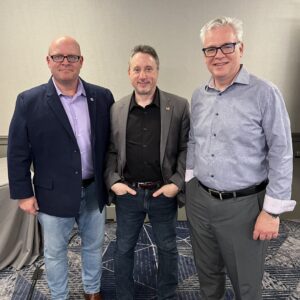|
|
 Jay Cuthrell, Jack Poller, and Stephen Foskett presented Ignite Talks at Cloud Field Day 21 |
This Talk date is October 23, 2024 at 15:00-16:00.
Presenter: Jack Poller, Jay Cuthrell, Stephen Foskett
Nine More Business Lessons I Learned From Baseball with Stephen Foskett
Watch on YouTube
Watch on Vimeo
Stephen Foskett revisits his original Ignite talk from nine years ago, where he shared nine business lessons he learned from baseball, and now presents nine more lessons with a more seasoned perspective. Reflecting on his earlier optimism, Foskett acknowledges that his new insights are perhaps more cynical, shaped by years of experience.
He begins by emphasizing the importance of “working the refs,” a metaphor for standing up for oneself in business, even when things don’t go your way. He also touches on the reality that money can indeed buy success, but warns that it’s not a foolproof strategy, as many teams and businesses have learned the hard way. Foskett highlights how management often chases trends, trying to replicate the success of others, but this approach rarely works because the landscape is constantly changing. Foskett also delves into the significance of attitude, noting that even the most talented teams or companies can fail if their people lack motivation or belief in what they are doing. He draws parallels between sports teams with high payrolls that underperform and businesses that think they can buy success without fostering a positive culture. He critiques the idea of the “wisdom of the crowds,” pointing out that popular opinion is often misguided, whether in sports, business, or politics. This leads to another lesson: past success does not guarantee future success. Foskett warns against relying too heavily on historical performance, as circumstances change, and what worked before may not work again.
In his final lesson, Foskett underscores the importance of resilience, stating that it takes many losses before achieving success. He encourages people not to be discouraged by failure, as it is a natural part of the journey toward winning. He concludes on a lighthearted note, reminding the audience not to take themselves too seriously. Drawing from the fun elements of baseball, like mascots and the “Take Me Out to the Ballgame” tradition, Foskett emphasizes that work should be enjoyable. He reflects on his own career, expressing gratitude for the challenges and joys of running Tech Field Day and Gestalt IT, and encourages others to find the same sense of play and fulfillment in their own professional lives.
Watch the original talk, 9 Business Lessons I Learned From Baseball!
Personnel: Stephen Foskett
2010 A Service Odyssey with Jay Cuthrell
Watch on YouTube
Watch on Vimeo
In his presentation, Jay Cuthrell reflects on predictions he made in 2008 and 2009 about the future of technology, particularly in the telecommunications and service provider sectors. He humorously critiques his own foresight, acknowledging both the hits and misses in his predictions. Cuthrell draws parallels between his predictions and the famous film “2001: A Space Odyssey,” suggesting that, like the film’s futuristic vision, his own ideas were speculative at the time. He recalls attending various tech conferences and events, such as Google I/O and TechCrunch, where he gathered insights and trends that informed his predictions. These included the rise of IPTV, mobile TV, fiber-to-the-premises, and voice over IP, many of which have since become mainstream, while others, like WiMAX and certain peer-to-peer technologies, have faded into obscurity.
Cuthrell also discusses the evolution of cloud computing, content delivery networks (CDNs), and the increasing importance of multi-RF devices, which allow for multiple radio frequencies in a single device. He notes that while some of his predictions, such as the widespread adoption of fiber optics in homes, were overly optimistic, others, like the growth of cloud-based services and the dominance of content delivery networks, have largely come to fruition. He highlights the shift from physical media to streaming services, with companies like Netflix and YouTube leading the charge, and the eventual dominance of cloud storage and computing. He also touches on the development of mobile infrastructure, such as femtocells and portable Wi-Fi solutions, which have become essential in rural areas and during large events.
In the latter part of the talk, Cuthrell reflects on the broader implications of his predictions, particularly in areas like session control, virtual routers, and impulse enablement, which aimed to simplify network access and transactions. He acknowledges that while some of these ideas have materialized, others were either ahead of their time or missed the mark. He also discusses the role of companies like Oracle in acquiring legacy telecom systems and the ongoing importance of DNS traffic in understanding user behavior. Ultimately, Cuthrell’s presentation serves as a retrospective on the rapid evolution of technology over the past decade, offering a mix of nostalgia, humor, and insight into the unpredictable nature of technological progress.
Personnel: Jay Cuthrell
Own Your Career – Career Management for the Modern Technologist with Jack Poller
Watch on YouTube
Watch on Vimeo
Jack Poller’s talk at Cloud Field Day 21 focuses on the importance of actively managing one’s career, particularly in the technology field. He shares his own career journey, which spans from engineering to marketing, consulting, and eventually becoming an industry analyst. Poller emphasizes that career success is not just about technical skills but also about understanding how to make a company more successful, either by increasing revenue or reducing costs. He highlights the importance of being adaptable and willing to take on new roles, as he did when he transitioned from engineering to marketing. Poller also stresses that in any role, the ultimate goal should be to contribute to the company’s success, and this requires understanding the business’s needs and how your work impacts the bottom line.
Poller also discusses the importance of influence and politics in the workplace, especially as one moves up the career ladder. He acknowledges that many technologists view office politics negatively, but he argues that it is a necessary part of getting things done, particularly in leadership roles. He uses examples from his own career, such as managing a crisis after a theft at a startup, to illustrate how sometimes difficult decisions must be made quickly, even if they are not popular. Poller also references the TV show *The Wire* as a great example of how politics, both formal and informal, play out in different organizations, from drug cartels to police departments. He encourages technologists to embrace the reality of workplace politics and learn how to build coalitions and influence others to achieve their goals.
Finally, Poller emphasizes the importance of networking and personal relationships in career advancement. He points out that while technology has made it easier to apply for jobs, it has also created barriers, such as AI-driven applicant tracking systems that may filter out qualified candidates. Therefore, building a strong professional network is crucial, as most job opportunities come through personal connections rather than resumes. Poller advises technologists to be proactive in seeking out mentors and building trust with colleagues, as trust is a key factor in career success. He concludes by encouraging the audience to take ownership of their careers, set clear goals, and continuously work toward them, rather than passively waiting for promotions or opportunities to come their way.
Personnel: Jack Poller









